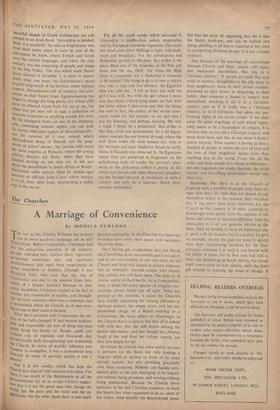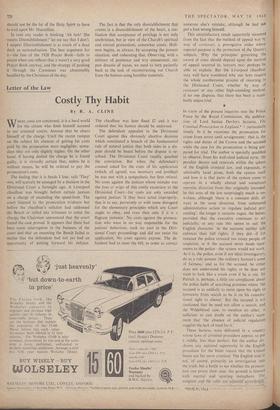The Churches
A Marriage of Convenience
. By MONICA FURLONG Tin: rot, as Mr. Charles Williams has pointed out in more academic language, set in with Constantine. Before Constantine, Christians had led the precarious existence of all minority groups, tolerated here, disliked there, vigorously Persecuted somewhere else, and successive establishments had eyed them suspiciously as either anarchists or lunatics. (Though it was Havelock Ellis who said that the rise of Christianity was due to the absence from Jeru- salem of a lunatic asylum.) Because of their social disabilities Christians tended to be few in number but remarkable in quality, and througii- not the early centuries there was a sweetness and 4 sPontaneity about the Church, as of men mov- ing at ease in their natural element. After the Concordat with Constantine the tex- ture of the faith changed. It had become fashion- able and respectable, the sort of thing any-man Could bring his family to. People could join without risk of reprisals and thousands did, Paradoxically both strengthening and weakening the Church. In terms of worldly influence and freedom to evangelise, it was a tremendous step forward. In terms of spiritual quality it was a disaster.
And it is this conflict which has kept the Church in a state of mild neurosis ever since. For there is too much of the Buchmanite in all the denominations for us to accept Christ's sugges- "o that it is not the great ones who change the Wnrhi, but the poor and the weak and the in- 6ignificant. On the other hand there is too much genuine spirituality in the Churches for them not to notice how costly their union with successive States has been.
Once 'having got compromise into her blood, the Church has never successfully got it out again. and in our own country in our own time, we see Church and State still locked in uneasy embrace. like an unhappily married couple who suspect that nobody else will have them. The State is, of course, useful to the Church. As in Constantine time, it keeps the nasty spectre of religious per- secution always firmly out of sight. More im- portant at the moment, it saves the Church's face, loyally concealing her waning influence in national matters, her empty pews, and her im- poverished clergy. At a Royal wedding or a Coronation, the State defers so charmingly to the Church that it is easy to feel that all is indeed well with her, that she still moves among' the people who matter, and that though her children laugh at her and flout her rulings openly, yet they care deeply for her.
In return the Church has some useful services to perform for the State, not only lending a fragrant whiff of incense to some of its more . corrupt actions, but also presiding gracefully over State occasions. Nobody can handle cere- monial quite as she can, managing to be impres- sive without being pompous, and moving without being sentimental, Because the Church never hesitates, in the best Christian tradition, to wash the State's feet when requested to do so, some of her critics, most notably the Beaverbrook press, fall into the error of supposing that she is also the State's wash-pot, and can be bullied into doing anything at all that is required of her, even to re-marrying divorced people. It is not a happy situation.
Also because of the marriage of convenience between Church and State, people still repeat that wearisome ejaculation, 'But this is a Christian country!' If people are (and they are) cruel to animals, thoughtless to the old, nasty to their neighbours. loose in their sexual conduct, perverted in their tastes, or disgusting in their habits, then someone is bound to remark how particularly shocking it all is in a Christian country, just as if it really was a Christian country, or as if Christians had taken out per- forming rights in the social virtues. If we clear away the great slag-heap of cant which regret- tably seems to be a.by-product of religion, it is obvious that we are not a Christian country, and never have been, and that in one sense it doesn't matter anyway. What matters is having at least a handful of people to whom the love of God and the love of their neighbour matter more than anything else in the world. From this all the aches and pains people fuss about so tediously— the new paganism, the empty churches, the crude morals, and the stifling materialism—would take their cure.
Supposing that there is in the Church of England such a handful of people (and there are signs that there is), then they are bound to ask themselves where at the moment their vocation lies. It has never been more important for the Church in this country or in other countries to disentangle itself gently from the clutches of the State. and reassert its mystical affiliation. Only by spirituality is it of any genuine service to the State. Only by turning its back on diplomacy. can it speak with the honesty that is required. To give an example, during the past ten years it should have been condemning racialism for the blas- phemous nonsense it is until it was hoarse with the effort. It knew, for its best sons had told it, what was happening in South Africa, but found itself constrained to wait silently until the. State got around to noticing the wind of change. It should not be the lot of the Holy Spirit to have to wait upon Mr. Macmillan.
In case any reader is thinking 'Ah hah! She means Disestablishment!' let me say that I don't. I suspect Disestablishment is as much of a dead duck as nationalisation. The best argument for it—the fate of the 1928 Prayer Book—falls to pieces when one reflects that it wasn't a very good Prayer Book anyway, and the strategy of pushing it through the Commons was abominably handled by the Christians of the day. The fact is that the only disestablishment that counts is a disestablishment of the heart, a rea- lisation that acceptance of privilege is not only unchristian, but in view of the Church's spiritual and eternal pretensions, somewhat comic. Holi- ness begins, as always, by accepting the present situation, and redeeming that. Observing, with a mixture of penitence and wry amusement, our past dreams of status, we need to turn patiently back to the task of reconstructing our Church from the bottom using humbler materials.







































 Previous page
Previous page